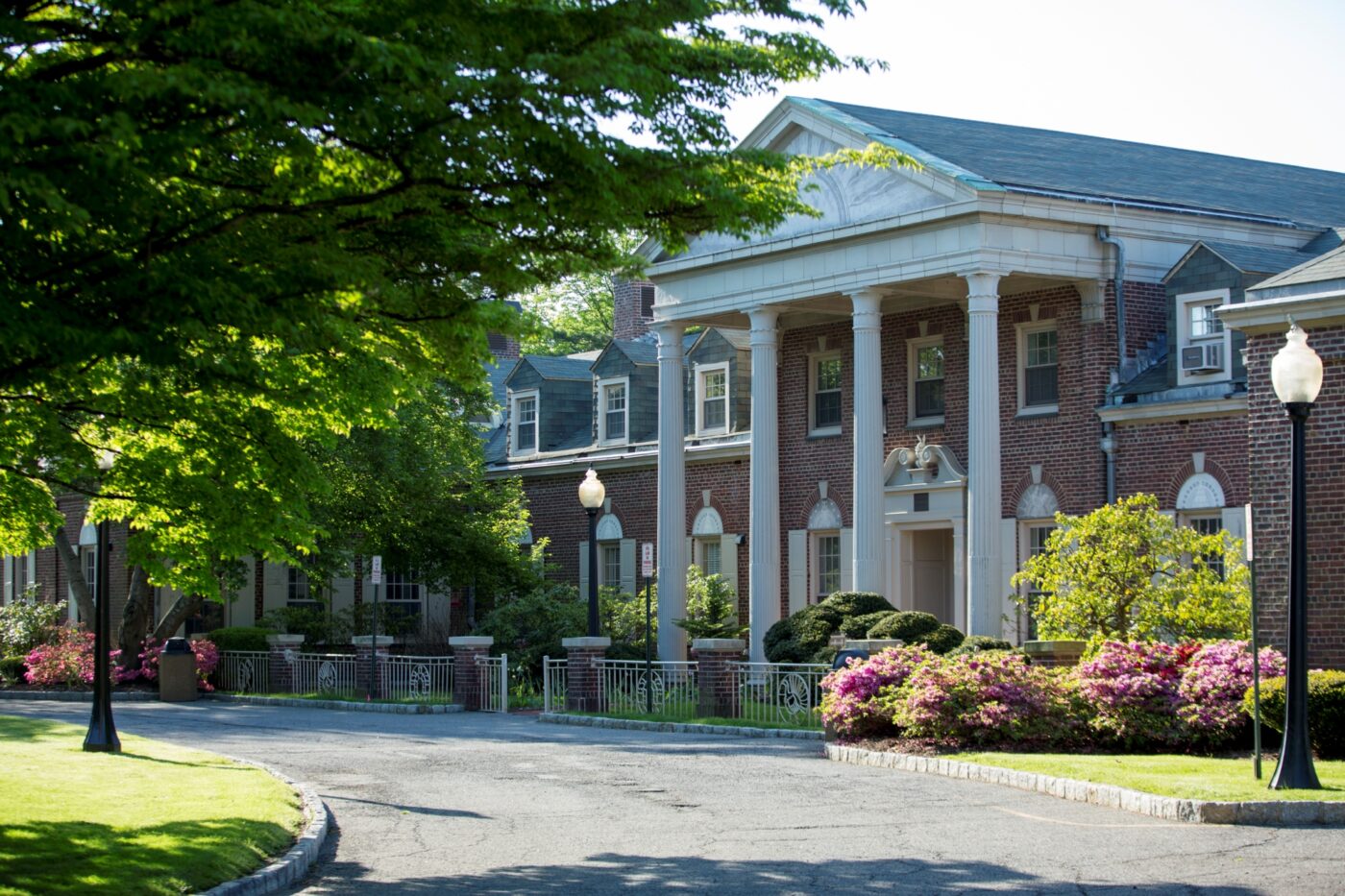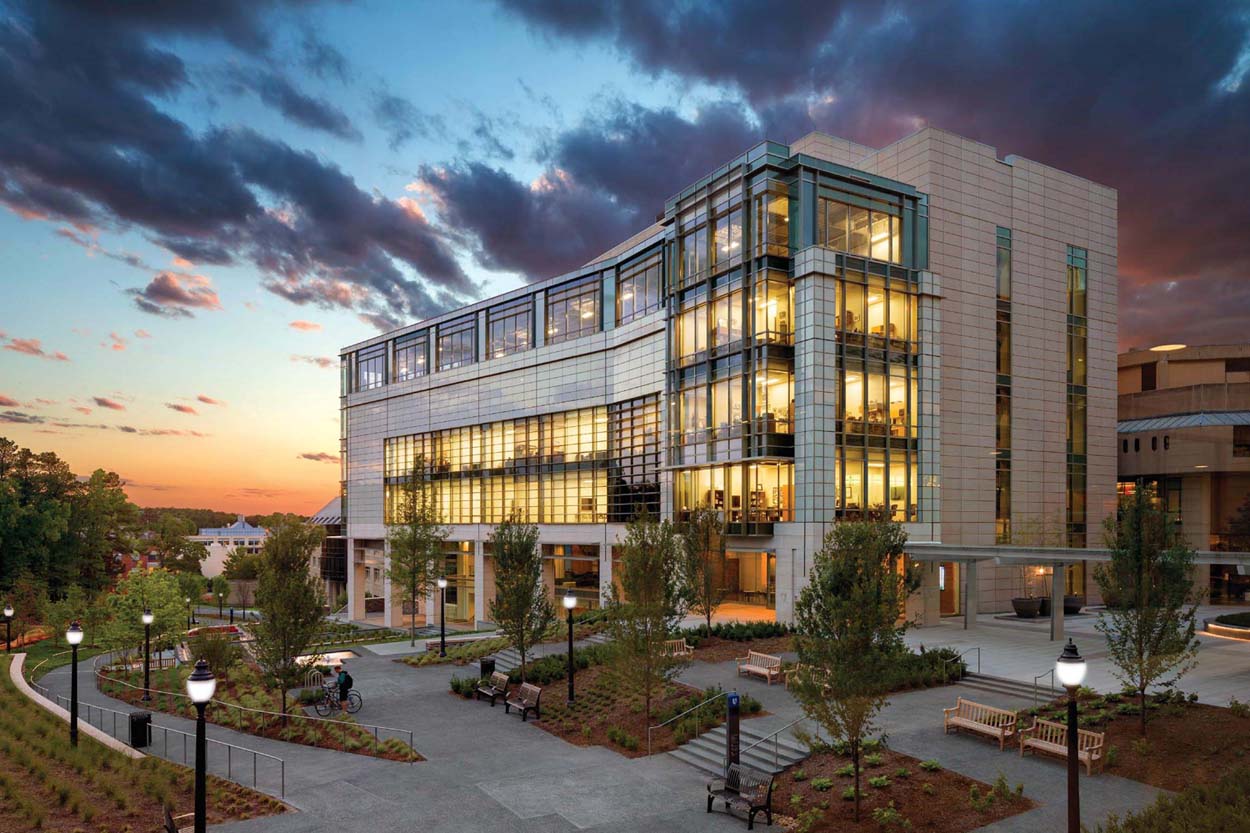Medical colleges in New York range from large research universities to small private colleges. Students interested in attending one of the New York medical colleges have many diverse options to choose from. Here, we’ll help you get a handle on which New York medical colleges are a good fit for you and provide important tips for getting into the school where you belong.
Compared to other states, medical colleges in New York can be quite competitive (one school on this list has an acceptance rate lower than 0.5%!) While this may be daunting, remember that with careful research, expert guidance, and self-directed preparation you can find the school that’s the perfect match for your unique skill set and professional goals.
We’ll get into what’s special about each of the New York medical colleges. However, when applying to any medical school, you’ll have a better chance of acceptance if you…
- Ace the MCAT
- Demonstrate AAMC’s Core Competencies
- Understand the Cost of Medical School in 2022
- Have Hands-On Pre-Med Clinical Experience
- Get Personalized Admissions Guidance
One of the beautiful things about New York medical colleges is the diversity of academic and clinical focus each school exhibits. So before you start your application, it’s important that you understand your own academic and professional interests to find a school that will allow you to pursue them. Being realistic about how your academic track record stacks up against your peers is important, but creating a list of schools that reflect your unique interests (or encourage you to explore different areas of medicine early on) is essential to finding a good fit.
If you have your heart set on New York medical colleges, we’ve compiled a list of the schools you’ll want to research and compare. We’ve organized them from top-ranking to unranked. These include:
- NYU Grossman School of Medicine
- Columbia University Vagelos College of Physicians and Surgeons
- Icahn School of Medicine at Mount Sinai Hospital
- Weill Cornell Medical College
- Albert Einstein College of Medicine
- University of Rochester School of Medicine and Dentistry
- Stony Brook University Renaissance School of Medicine
- University of Hofstra Zucker School of Medicine
- Jacobs School of Medicine and Biomedical Sciences at the University at Buffalo
- SUNY Upstate Medical University Norton College of Medicine
- New York Medical College
- Lake Erie College of Osteopathic Medicine
- Albany Medical College
- Touro College of Osteopathic Medicine
- New York Institute of Technology College of Osteopathic Medicine
- SUNY Downstate Health Sciences University College of Medicine
- NYU Long Island School of Medicine
- CUNY School of Medicine
Is New York a Good Place to Study Medicine?
New York is a great place to attend medical school for many reasons. To start, the state is home to some of the busiest hospitals and most cutting-edge medical facilities in the world. This means that students have access to top-notch clinical training and can learn from some of the most experienced doctors and nurses. Students witness firsthand the latest medical advances and treatments and see how experts handle a wide variety of cases.
Medical students who train in busy hospitals and clinics are well prepared to enter the workforce and make a difference in the lives of their patients. And being exposed to the latest medical technology in practical, real-world settings gives them insight into how to best use these tools in their future careers.
Most importantly for many, New York is a diverse and multicultural city with people from all walks of life living and working side by side. This diversity is reflected in the patient populations that medical students will encounter during their clinical rotations, as well as the makeup of classmates and mentors.
Working with diverse populations is an invaluable experience for future doctors who need to be able to understand, communicate with, and effectively care for patients from all backgrounds. Diverse patient and doctor populations allow students to learn from a variety of perspectives and gain skills that they can use in any number of future settings. Those who study medicine among diverse cultures and populations will be well-positioned to work in any number of medical environments, whether urban, rural, inner-city, or abroad.
New York is also home to some of the country’s highest-ranked medical schools, such as Weill Cornell Medical College, Columbia University Vagelos College of Physicians and Surgeons, and NYU Grossman School of Medicine. These institutions train some of the best doctors in the country and have a long history of producing groundbreaking research.
When you aren’t in school, the state of New York offers a range of activities and attractions to keep you engaged. From the vibrant city life of New York City to the natural beauty of the Adirondack Mountains, there is something for everyone. And with medical schools located in different parts of the state, you can explore all that New York has to offer while still getting a world-class education.
In short, New York offers medical students a wealth of opportunities to learn, grow, and prepare for successful careers in medicine. So let’s discuss how to get into one of the state’s many excellent medical schools.
Application Strategies for New York Medical Colleges
Below, we lay out key admissions statistics and profiles of every medical school in New York. You can use this information to help focus your application strategy and make well-informed decisions about where to apply.
To start, each school is unique. Some are research powerhouses, others have an intense focus on primary care and population health, and many have a blend of both. We highlight the unique programs and features of each school to help you get a sense of what each offers.
While your chances of getting into NY medical schools will certainly depend on your academic track record, it’s often more important to demonstrate fit with a particular institution. This means having a clear understanding of what each school is looking for in an ideal candidate and making sure your application reflects that.
How do you demonstrate fit? Start with a list of schools you are genuinely excited about attending — schools with programs and missions that excite you and speak to your professional and personal ambitions.
For instance, many of the top-ranked New York medical schools are internationally renowned for their research programs. But there are many schools in New York with community-focused learning and training programs that place an emphasis on primary care, population health, and serving underserved communities. And then some offer specialized programs in rural healthcare. A school’s location and healthcare network also play an important role.
Overall, New York medical schools represent a wide range of focus and interests.
However, demonstrating fit for a medical school requires more than genuine interest. You need to show admissions your dedication and fluency in particular aspects of medicine through concrete experience and self-directed learning in your pre-med years.
For prospective medical students with clear professional goals, focused pre-med experience goes a long way. For instance, enrolling in one of IMA’s pre-med internships abroad gives you compelling, hands-on experience with diverse patient populations and valuable insights into global healthcare systems. Shadowing physicians and engaging in specialized lectures demonstrate your dedication to medicine. Your application will stand out if you can speak fluently about these experiences and how they have helped you develop as a future physician. Focused internships also show your dedication to self-directed study, and your application will reflect a genuine passion for your desired specialty.
If you have your sights set on one of the more interdisciplinary schools, such as The University of Rochester School of Medicine and Dentistry, then structure your undergraduate or post-baccalaureate coursework accordingly. Even if you are interested in a more clinically-focused medical school experience, many of the schools listed here look for a record of broad, exploratory undergraduate coursework. Though, some schools statistically favor certain majors, such as biology and neuroscience.
Cost of living and tuition is another thing to consider. New York is an expensive state to live in, and medical school is already a costly investment. However, some schools are located in areas with lower costs of living, and some NY schools offer free tuition and debt-free financial aid. Public universities will be more affordable for residents, while private institutions will cost the same for both in-state and out-of-state matriculants.
Finally, refer to admission statistics to get a clearer idea of your chances of getting into a school. When creating your list of schools to apply to, pay attention to the average GPA and MCAT scores for admitted students as well as the acceptance rate.
The average MCAT score for applicants accepted to New York medical schools ranges from 502 to 522, and GPA ranges from 3.47 to 3.96. In our list of NY medical schools below, we detail the average MCAT score and GPA for each school, as well as the school’s acceptance rate.
We also show you the interview rates for in-state vs. out-of-state applicants. This helps you get a sense of whether your state of residence gives you an advantage, which can make a big difference when it comes to deciding where to apply. If, for instance, your academic record is well above a school’s average, but admissions interviews less than 4% of out-of-state applicants, you may want to prioritize other schools on your list.
Overall, this article provides an overview of what you need to know about New York medical colleges in 2022. While this information will help you stay organized when thinking about NY medical schools, it’s important to further research for each school to make sure it’s the right fit for you. Our Ultimate Medical School Guides cover everything you need to know, including sample supplemental essay responses, selection criteria, deep admissions statistics, and more.
Make Your Applications Count: Medical School Admissions Consulting
There is plenty of general advice out there about what you should do to get into medical school, but very little that is tailored to your individual circumstances. Your admissions journey is unique, and you need an admissions consultant who will understand your needs, provide comprehensive support, and guide you every step of the way.
At International Medical Aid, we specialize in helping students get into their dream schools, whether they’re looking for traditional allopathic (MD) programs or innovative osteopathic (DO) schools. Whichever NY school catches your eye, chances are we’ve helped dozens and dozens of students just like you get in.
We offer a range of services, from comprehensive, overall strategy sessions to interview preparation, essay editing, and more. If you’re applying to medical school, let us help you put your best foot forward so you can study where you most belong. Explore our medical school admissions consulting today and schedule a free consultation with one of our admissions experts.
New York Medical Colleges
Below, we give you the most important information about each of the medical colleges in New York, including:
- School Profiles
- School Ranking
- Average MCAT Score
- Average GPA
- Acceptance Rate
- In-State/Out-of-State Interview Rates
- Unique Factors to Consider
Without further ado, let’s explore the New York medical colleges!
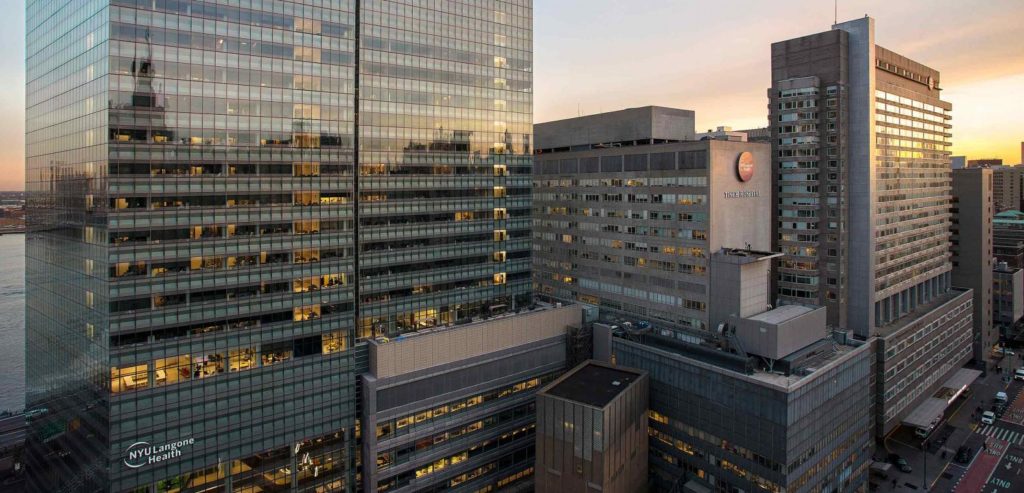
NYU Grossman School of Medicine
The NYU Grossman School of Medicine was founded in 1841 and is located in Midtown Manhattan.
- #2 in Best Medical Schools: Research
- #48 in Best Medical Schools: Primary Care
- Interview Rates: 7.2% In-state, 9.1% Out-of-state
- Acceptance Rate: 2.4%
- Average GPA: 3.96, Average MCAT: 522
The New York University Grossman School of Medicine awards every MD student full-tuition scholarships, regardless of merit or financial need. While students should still plan to cover administrative fees and other expenses, this does make NYU one of the most affordable medical schools in the nation — and therefore one of the most applied to schools in New York.
Given that NYU Grossman SOM is internationally recognized for its exceptional research programs (ranked No. 2 in the nation in Medical School Research), competitive applicants will have plenty of experience in research and a strong track record of academic achievement.
NYU Grossman SOM is also unique in offering a three-year accelerated MD program, something only a handful of medical schools currently provide in the United States.
Primary applications are due by October 15 and secondary applications are due by November 15. Multiple “mini interviews” take place between September and December. Accepted applicants are notified in January.
- Tuition-free
- Three-year MD program available
- Top Medical Research School
- Very competitive

Columbia University Vagelos College of Physicians and Surgeons
Columbia University’s Vagelos College of Physicians and Surgeons was founded in 1767 and is located in the Washington Heights neighborhood of Manhattan.
- #3 in Best Medical Schools: Research
- #75 in Best Medical Schools: Primary Care
- Interview Rates: 8.4% In-state, 11.7% Out-of-state
- Acceptance Rate: 3.4%
- Average GPA: 3.93, Average MCAT: 521
One of the oldest medical schools in the country, The Columbia University Vagelos College of Physicians and Surgeons awarded the first MD degree in the thirteen colonies. In 2018 it achieved another medical school first by offering scholarships in the place of loans for students who qualified for financial aid.
This Ivy League university is one of the top research medical schools in the U.S. Applicants with strong research experience and an excellent record of academic achievement in the sciences will be the most competitive.
The Columbia University Vagelos College of Physicians and Surgeons isn’t all about research, of course. In fact, in 2010, the school began to offer a second MD track, the Columbia-Bassett Program. This program supplements Columbia’s clinical training with experience with trauma-based and longitudinal care in a rural healthcare environment.
The school advises prospective students to use their pre-med years exploring a broad range of subjects. Applicants who can demonstrate following their personal passions and interests during their time as undergraduates often make the most well-rounded and successful applicants to Columbia’s medical school.
Primary applications are due by October 15th for Columbia, and the secondary application is due by October 22nd. All of the supporting documents must be submitted by end of the next week, October 29th. Interview invitations are sent between August and January.
- Financial aid is debt-free
- Multiple MD tracks and student-run free clinics
- Top Medical Research School
- Very competitive

Icahn School of Medicine at Mount Sinai
The Icahn School of Medicine at Mount Sinai was established in 1963 and is located in Manhattan’s Upper East Side near East Harlem.
- #11 in Best Medical Schools: Research
- #71 in Best Medical Schools: Primary Care
- Interview Rates: 9.7% In-state, 7.8% Out-of-state
- Acceptance Rate: 5.7%
- Average GPA: 3.86, Average MCAT: 519
Another top-performing research school, the Icahn School of Medicine operates within Mount Sanai hospital, giving students a fully immersive experience in the world of healthcare.
The Icahn School of Medicine at Mount Sinai aims to enroll half of its MD students through its FlexMed program. Pre-med students who take the FlexMed path are encouraged to pursue any major they are passionate about and are required to take certain humanities courses in addition to the usual pre-med prerequisites.
For those interested in pursuing PhDs, the Icahn School of Medicine holds the title of 2nd best PhD program in the nation.
The most competitive applicants to Icahn School of Medicine will have significant experience in patient contact hours, volunteering, and/or clinical research. Undergraduates who pursue the early-assurance FlexMed program are also at an advantage, as they will have demonstrated their commitment to the school’s mission of redefining medical education.
For Icahn SOM, the primary application is due by October 1st and the secondary is due by November 1st. The school accepts students on a rolling basis and releases decisions from December to August.
- Located insided the Mount Sinai Hospital
- Community service focused
- Top Medical Research School
- Acceptance rate similar to the national average
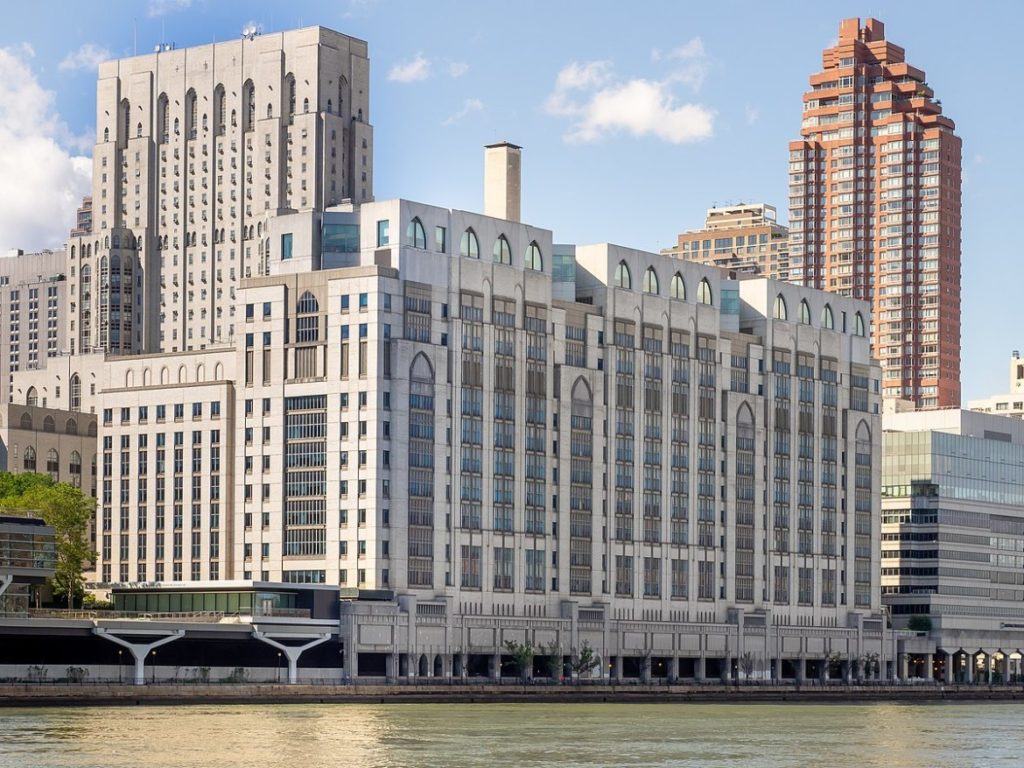
Weill Cornell Medical College
Weill Cornell Medical College was founded in 1898 and is located in the Upper East Side of Manhattan.
- #14 in Best Medical Schools: Research
- #45 in Best Medical Schools: Primary Care
- Interview Rates: 8.4% In-state, 10.6% Out-of-state
- Acceptance Rate: 5.36%
- Average GPA: 3.93, Average MCAT: 520
Weill Cornell is consistently ranked as one of the top medical schools in the country, and for good reason. Like the schools listed above, Weill Cornell is a top-ranked research school, but it’s also the second-highest ranked medical school in New York for primary care.
The school’s curriculum aims to produce well-rounded doctors through self-directed and small-group learning. Weill Cornell also boasts incredible global health studies, with study-abroad research opportunities in over 60 countries.
Following Columbia’s lead to reduce student loans for medical school grads, Weill Cornell offers debt-free financial aid for qualifying students.
Weill Cornell also offers a unique Tri-Institutional MD/PhD program in collaboration with Rockefeller University and Sloan Kettering Institute.
The primary application for Weill Cornell is due by October 15th, and the secondary application is due by November 15th.
- Financial aid is debt-free
- Emphasis on global health
- Top Medical Research School
- Acceptance rate is slightly lower than the national average
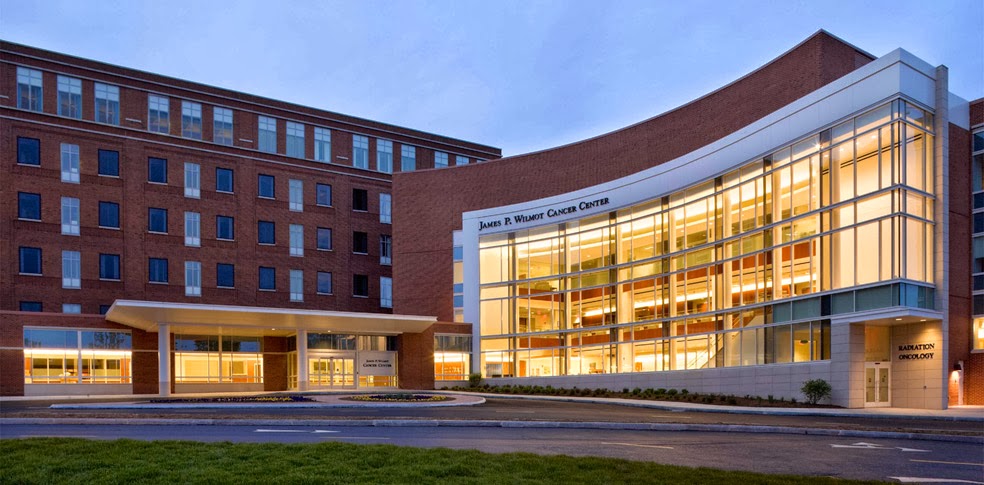
University of Rochester School of Medicine and Dentistry
The University of Rochester School of Medicine and Dentistry was founded in 1925 and is located in Rochester, about six hours northwest of New York City.
- #37 in Best Medical Schools: Research
- #26 in Best Medical Schools: Primary Care
- Interview Rates: 11.2% In-state, 10.5% Out-of-state
- Acceptance Rate: 4.37%
- Average GPA: 3.86, Average MCAT: 517
The University of Rochester School of Medicine and Dentistry (URSMD) is the highest-ranking medical school for primary care in New York. Global health, community service, and community clinics are all central to the school’s curriculum. In fact, URSMD offers an MD with Distinction in Community Health.
URSMD uses a “Biopsychosocial Model” for its curriculum, which includes exploring the biological, psychological, and social aspects of medicine with an interdisciplinary, liberal-arts style approach.
The deadline for primary applications at URSMD is October 15th and secondary applications are due by November 15th. Interviewers take place between September 1st and March 15th.
- Community-focused
- Interdisciplinary curriculum
- Top Primary Care School
- Competitive
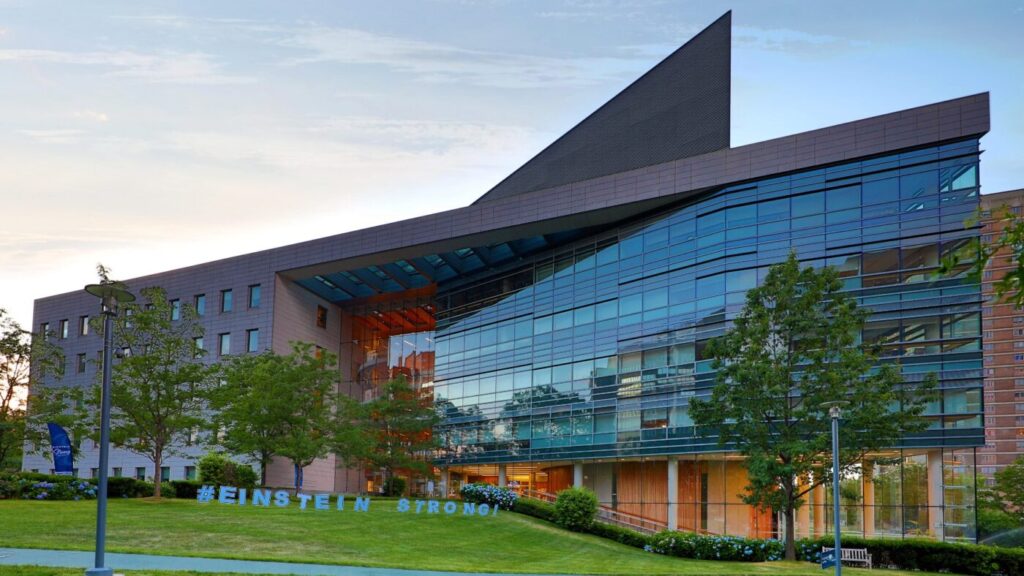
Albert Einstein College of Medicine
The Albert Einstein College of Medicine was founded in 1953 and is located in the Morris Park neighborhood of the Bronx.
- #37 in Best Medical Schools: Research
- #56 in Best Medical Schools: Primary Care
- Interview Rates: 24.1% In-state, 8.3% Out-of-state
- Acceptance Rate: 4.3%
- Average GPA: 3.82, Average MCAT: 516
The Albert Einstein College of Medicine ranks high in both research and primary care, and heavily weighs experience in both when evaluating candidates.
The school describes the MD program as “research-intensive.” The program also includes global health fellowships and community-based service-learning. Students gain clinical experience in public hospitals throughout three New York City boroughs. Teaching sites see students working with a diverse and underserved population.
The primary application for Albert Einstein College of Medicine is due by October 15th. Interview invitations are sent between August and March.
- Research heavy
- Community-based learning
- High in-state interview rates
- Competitive
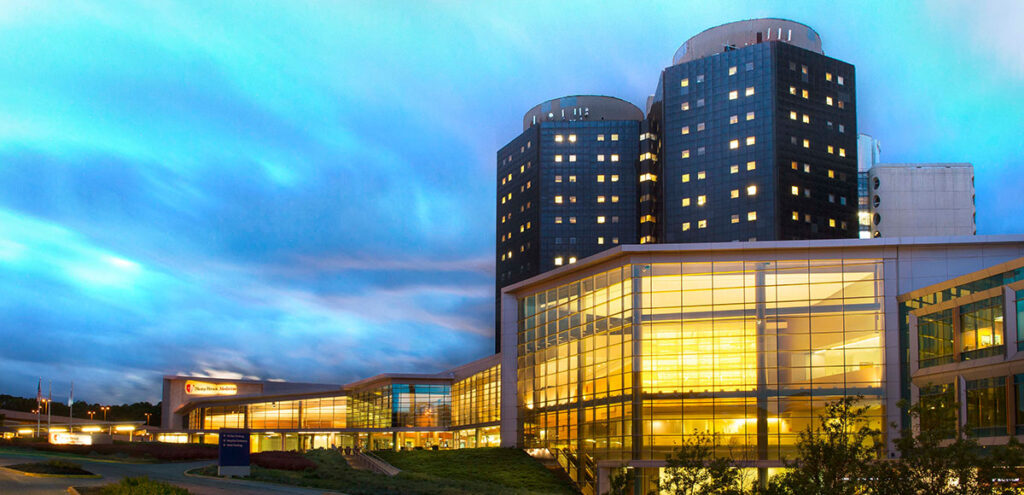
Renaissance School of Medicine at Stony Brook University
The Renaissance School of Medicine at Stony Brook University was founded in 1971 and is located in Brookhaven on the North Shore of Long Island.
- #53 in Best Medical Schools: Research
- #94 in Best Medical Schools: Primary Care
- Interview Rates: 21.1% In-state, 11.4% Out-of-state
- Acceptance Rate: 7.9%
- Average GPA: 3.86, Average MCAT: 517
Stony Brook University’s Renaissance School of Medicine is the highest-ranked public medical school in the state, making it one of the most applied-to medical colleges in New York. With high in-state interview rates and relatively low in-state tuition, this school may be a good option for New Yorkers looking to stay in-state for medical school.
The Renaissance School of Medicine offers courses in global and telehealth and centers professional and ethical development in its curriculum. The MD program includes five scholarly concentrations, so students can tailor their education to their interests and career goals.
The deadline to submit your primary application to the Renaissance School of Medicine is December 1st. The supplemental application and supporting materials are due by December 30th.
- Top-ranked public medical school in New York
- Accelerated three-year MD program
- High in-state interview rates
- Higher acceptance rate than average for medical schools
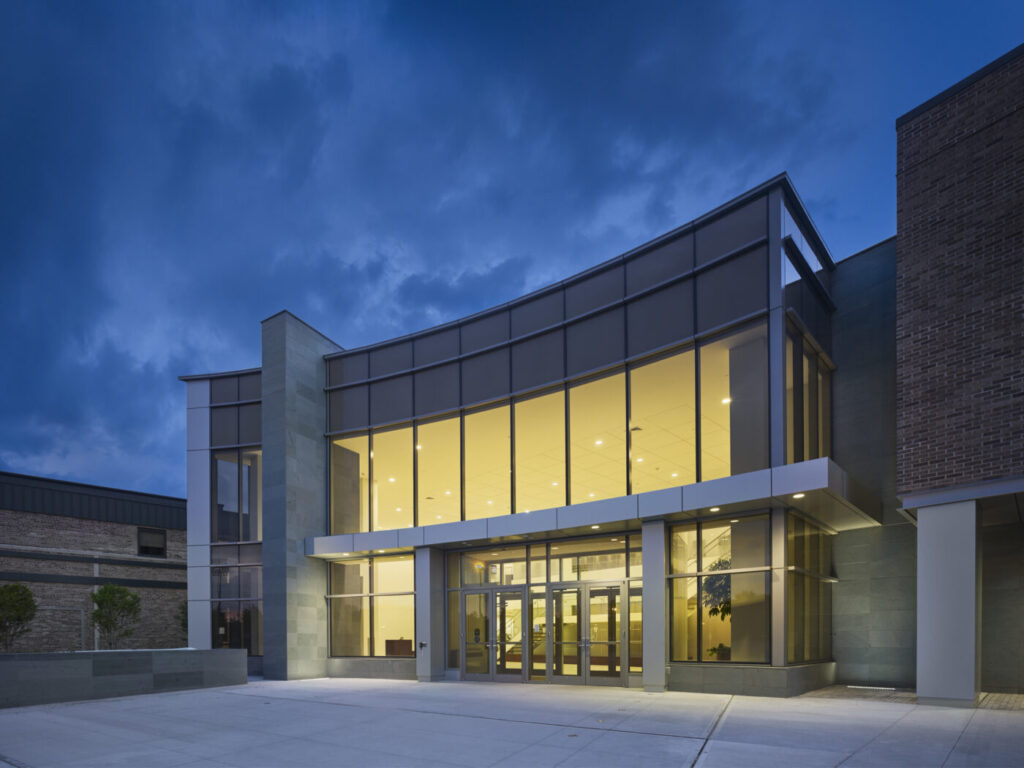
Hofstra University Zucker School of Medicine
Hofstra University’s Zucker School of Medicine was established in 2008 and is located in Hempstead, just east of New York City.
- #64 in Best Medical Schools: Research
- #94 in Best Medical Schools: Primary Care
- Interview Rates: 21.7% In-state, 11.7% Out-of-state
- Acceptance Rate: 7.01%
- Average GPA: 3.84, Average MCAT: 519
Established less than two decades ago, Hofstra University’s Zucker School of Medicine has quickly climbed the medical school ranks through its exceptionally state-of-the-art research facilities, effective problem-based pedagogy, and strong partnerships with regional healthcare systems.
The Zucker School of Medicine champions many of the valuable practices of contemporary med school learning, such as small-group, self-directed learning, and assessment-driven as well as early patient interaction.
The deadline for the primary application at the Zucker School of Medicine is November 1st.
- Contemporary curriculum and learning practices
- Cutting-edge research facilities
- High in-state interview rates
- Higher acceptance rate than average for medical schools
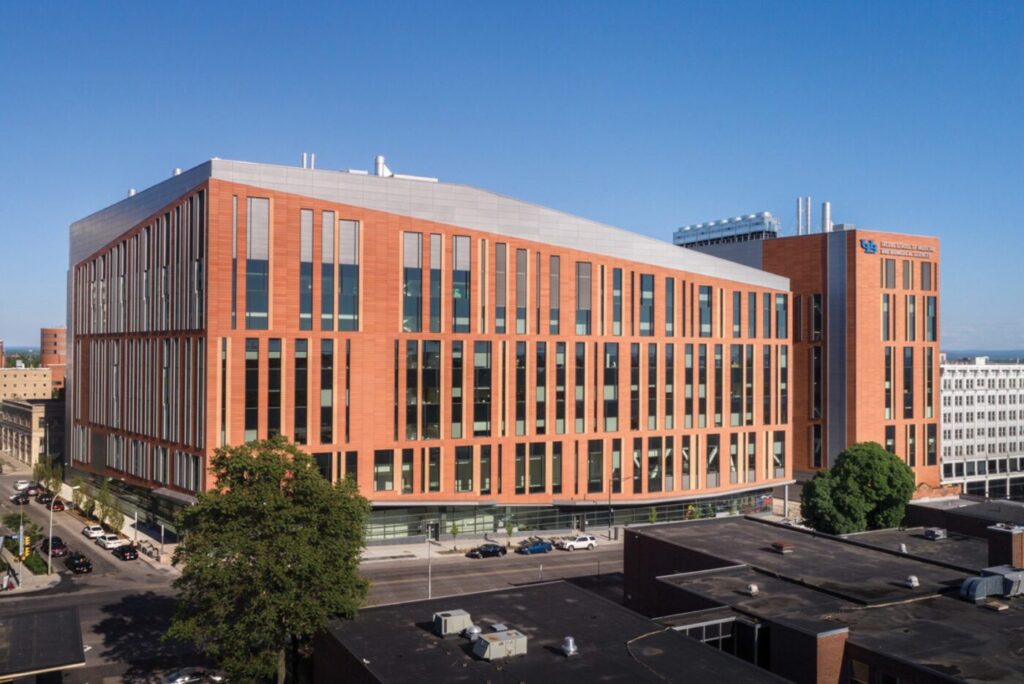
Jacobs School of Medicine and Biomedical Sciences at the University at Buffalo
The Jacobs School of Medicine and Biomedical Sciences at the University at Buffalo was founded in 1846 and is located in Buffalo, seven hours northwest of New York City.
- #74 in Best Medical Schools: Research
- #90 in Best Medical Schools: Primary Care
- Interview Rates: 20.8% In-state, 3.2% Out-of-state
- Acceptance Rate: 10.86%
- Average GPA: 3.72, Average MCAT: 511
The graduates of the University of Buffalo’s School of Medicine and Biomedical Sciences excel in licensing and residency matches at a fraction of the cost of many medical schools.
The school emphasizes a collegial, team-based spirit in medical school in hopes of fostering a generation of collaborative physicians and clinical scientists. Early on, students from community physicians, and are posed with real-world problems to solve.
The deadline for the primary application at University at Buffalo is November 15th, and the secondary is due by December 15th. Interviews are arranged between August and April.
- Affordable in-state tuition
- Supportive faculty
- High in-state interview rates but low out-of-state rates
- Higher acceptance rate than average for medical schools
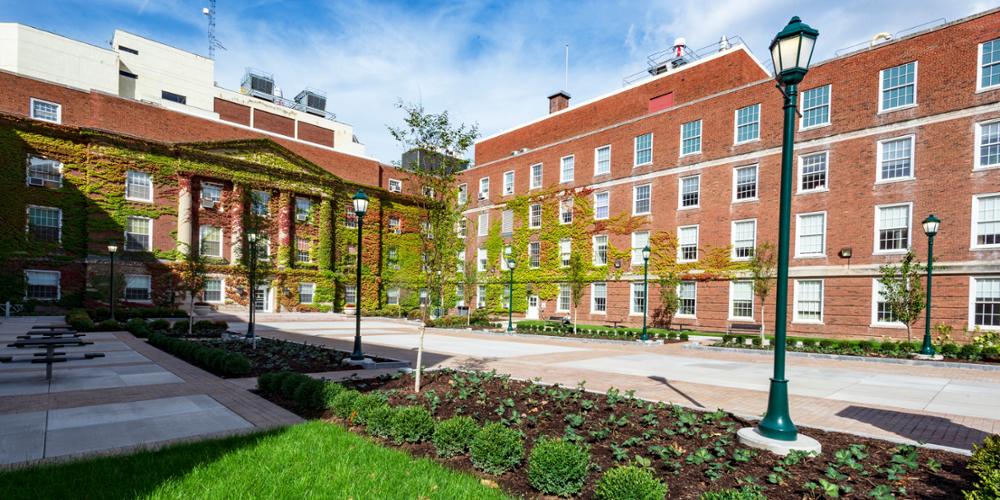
Upstate Medical University Norton College of Medicine
The Upstate Medical University Norton College of Medicine was founded in 1950 and is located in Syracuse, a little over four hours north of NYC.
- #87 in Best Medical Schools: Research
- #94 in Best Medical Schools: Primary Care
- Interview Rates: 23.2% In-state, 8.5% Out-of-state
- Acceptance Rate: 8%
- Average GPA: 3.79, Average MCAT: 514
Upstate Medical University’s Norton College of Medicine is committed to educating “compassionate, collaborative physicians” who can serve the health needs of their communities.
The school’s MD program emphasizes small-group learning experiences, early clinical exposure, and supportive environments to give students a solid, encouraging foundation in medicine.
Of note is the university’s commitment to serving its surrounding populations through the Special Rural Medical Scholars Program and Center for Civic Engagement.
The primary application is due to Norton College of Medicine by October 15th, and the secondary application is due by December 1st.
- Special Rural Medical Scholars Program
- Center for Civic Engagement
- High in-state interview rates
- Higher acceptance rate than average for medical schools
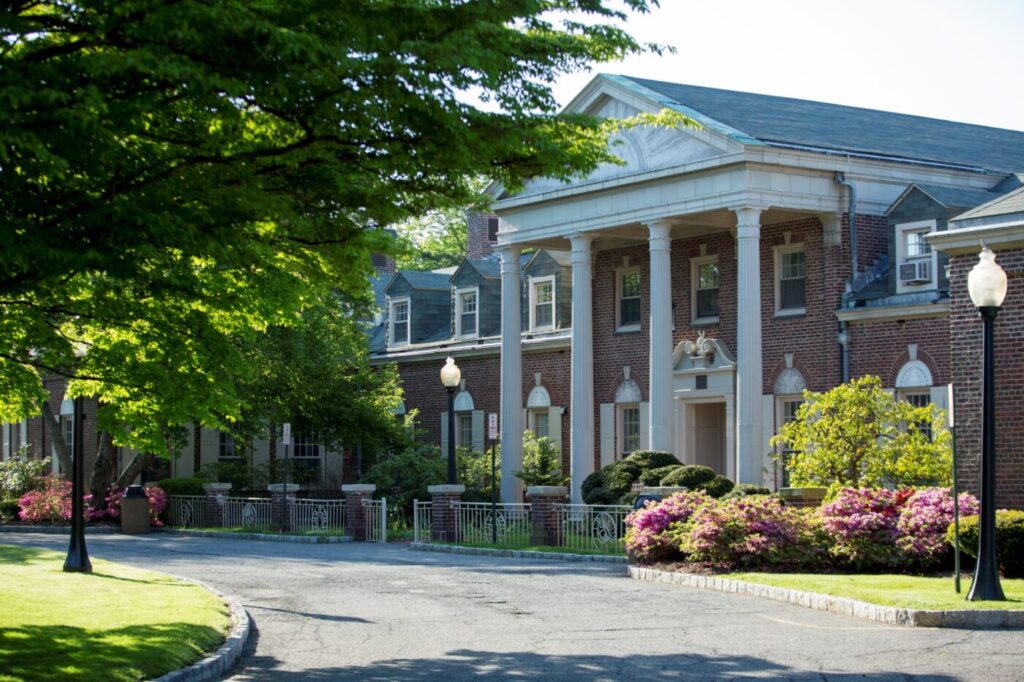
New York Medical College
New York Medical College was founded in 1860 and is located in Valhalla, Manhattan.
- #93 in Best Medical Schools: Research
- #94 in Best Medical Schools: Primary Care
- Interview Rates: 15.5% In-state, 3.4% Out-of-state
- Acceptance Rate: 5.2%
- Average GPA: 3.7, Average MCAT: 514
New York Medical College has over 25 teaching sites spanning three states. The school emphasizes the importance of discovery and exploration by providing first and second-year medical students ample opportunities to engage in a variety of research and clinical focuses.
In addition the being one of the oldest medical colleges, it’s also one of the largest. The school’s location in Valhalla provides students with peaceful, natural surroundings while only being a few minutes from New York City’s metropolitan hub.
The deadline for New York Medical College’s primary application is October 15th, and the secondary application is due by December 1st. Interviews are offered on a rolling basis beginning in August.
Your AMCAS primary application is due to New York Medical College by December 15th, and the deadline for the supplemental application is January 31st.
- Peaceful location with quick access to New York City’s hub
- Large campus with diverse teaching sites
- Acceptance rate slightly lower than the national average
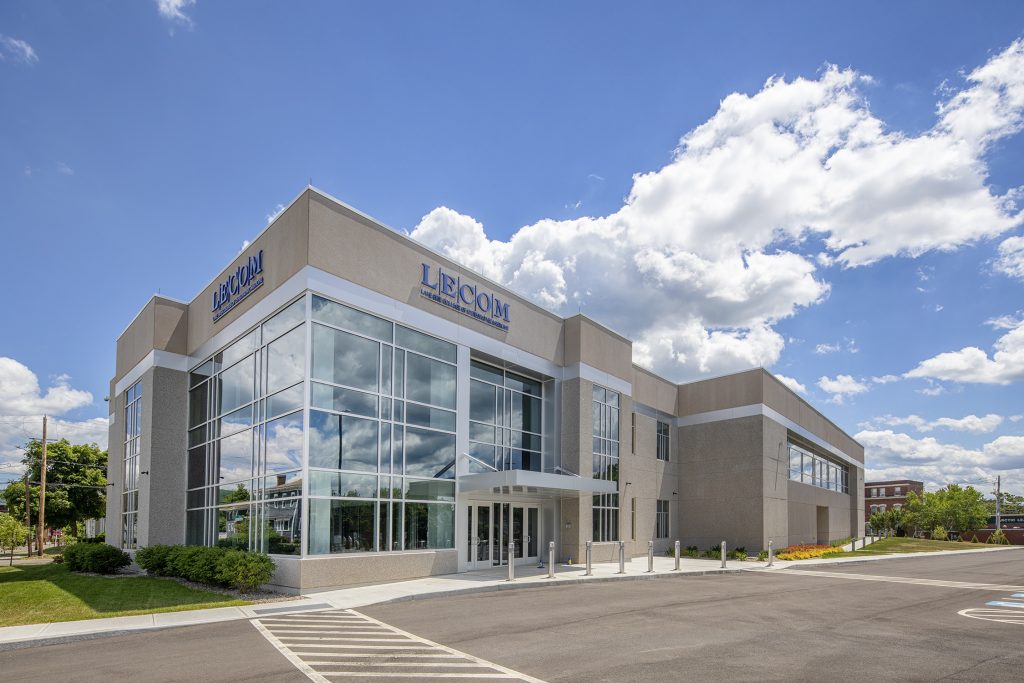
Lake Erie College of Osteopathic Medicine (Elmira Campus)
The Lake Erie College of Osteopathic Medicine was founded in 1992 and has a campus in Elmira, four hours northwest of New York City.
- #95 in Best Medical Schools: Research
- #88 in Best Medical Schools: Primary Care
- Acceptance Rate: 6.9%
- Average GPA: 3.5, Average MCAT: 503
The Lake Erie College of Osteopathic Medicine’s Elmira campus is less than five years old, but the greater Lake Erie medical school network has a proven track record of progressive pedagogy and fine ranks in research and primary care.
At the Lake Erie College of Osteopathic Medicine, medical students choose between five pathways: Lecture Discussion Pathway, Problem-Based Learning Pathway, Direct Study Pathway, Primary Care Scholars Pathway, and Accelerated Physician Assistant Pathway.
Each pathway is designed to provide excellent education and to meet the unique needs and interests of different students.
The Elmira campus was created to help address physician shortages in the area. The pathways at Lake Erie College of Osteopathic Medicine reflect with focus on practicality, with accelerated programs designed to teach medical students real-world doctoring skills and get them on the path to healing the community.
The Lake Erie College of Osteopathic Medicine uses the American Association of Colleges of Osteopathic Medicine Application Service (AACOMAS). The AACOMAS and the supplemental application are due by April 1st.
- DO degree
- Exceptional freedom and variety of degree pathways
- Acceptance rate slightly higher than the national average
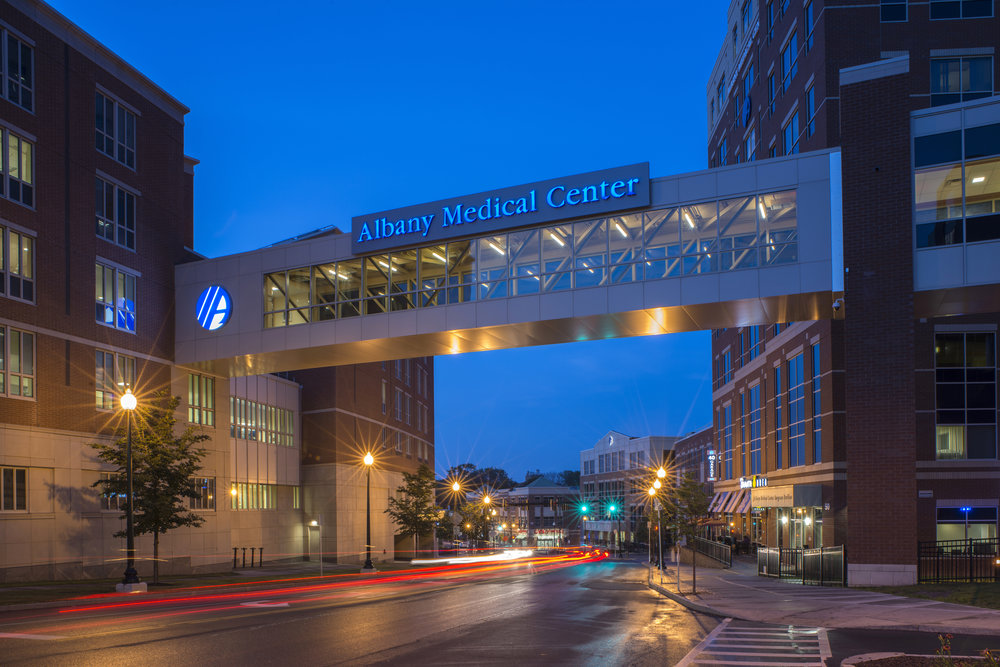
Albany Medical College
Albany Medical College was founded in 1839 and is located in Albany, three hours north of New York City.
- Unranked
- Interview Rates: 11.7% In-state, 4.1% Out-of-state
- Acceptance Rate: 4%
- Average GPA: 3.73, Average MCAT: 510
Albany Medical College attracts students hoping to learn medicine at the busiest level 1 trauma center in New York — Albany Medical Center Hospital.
Albany Medical College is the only medical school in the Capital Region of New York. It offers a traditional MD program, where students spend the first two years focusing on the foundational sciences of medicine. The third and fourth years are spent completing clinical rotations at Albany Medical Center Hospital and other affiliated hospitals.
AMCAS applications are due by November 1st, and secondary applications are due by December 1st. Interviews begin in September. Decisions are sent out on a rolling basis beginning in October.
- Traditional MD program
- Rolling admissions
- Competitive
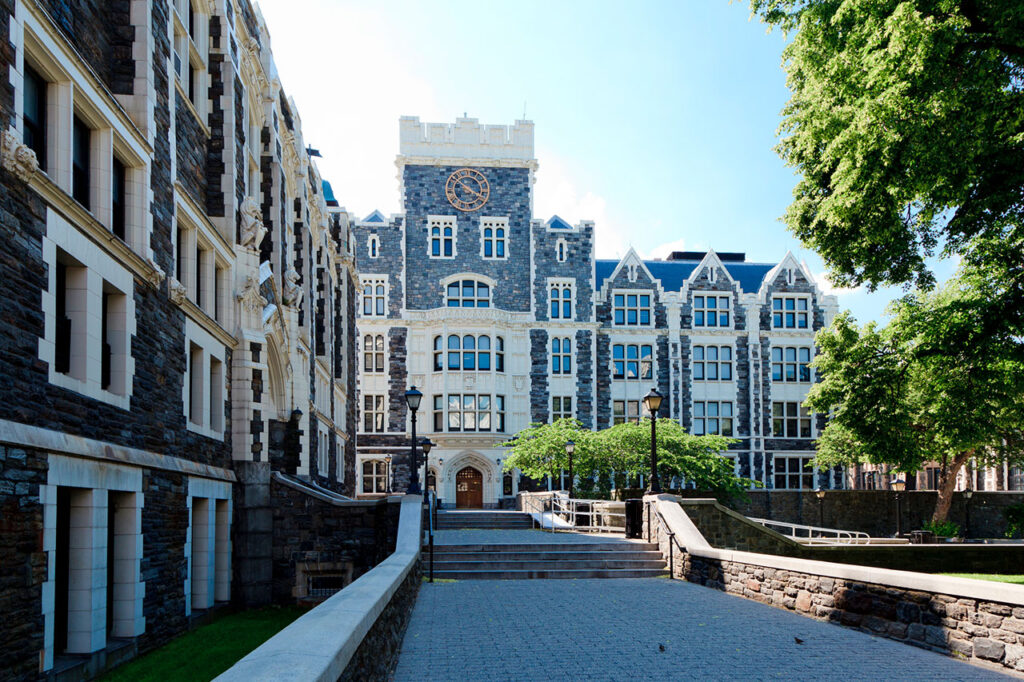
City University of New York (CUNY) School of Medicine
The CUNY School of Medicine was established in 2016 and is located in Hamilton Heights in Northern Manhattan.
- Unranked
- Interview Rate: 34.8%
- Acceptance Rate: 10.4%
- Average GPA/MCAT: N/A; CUNY SOM only offers a BS/MD program.
The CUNY School of Medicine aims to bring underrepresented and low-income communities into the medical profession through low-tuition and an innovative seven-year BS/MD program. The school has a small, tight-knit community of faculty and students with active alumni mentors.
The deadline for applications is December 31st.
- Seven-year BS/MD program
- Focus on primary care and public health
- Acceptance rate is much higher than the national average
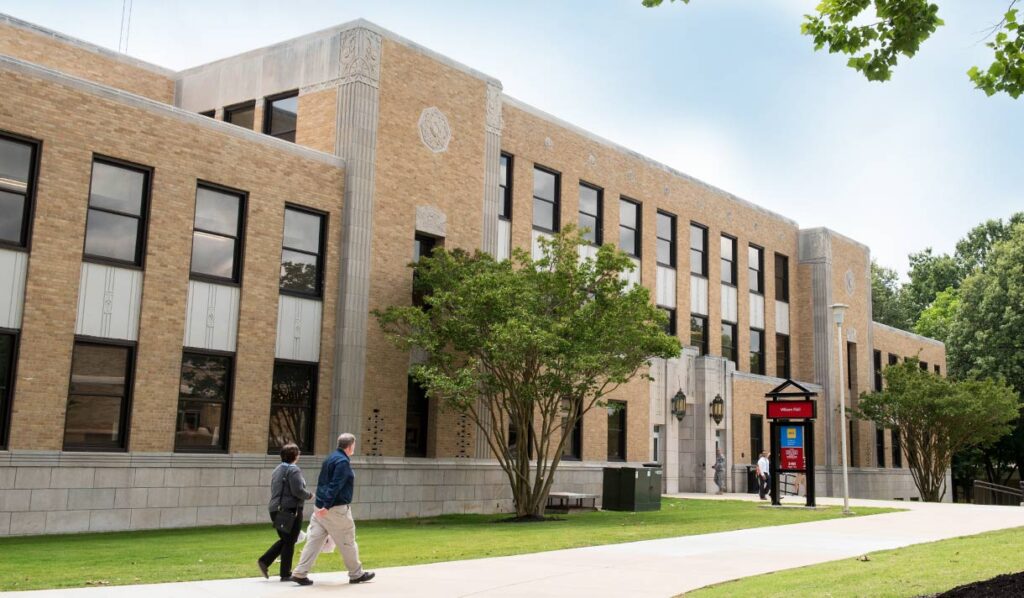
New York Institute of Technology College of Osteopathic Medicine
The New York Institute of Technology College of Osteopathic Medicine was founded in 1977 and is located in Old Westbury, about half an hour northeast of New York City.
- Unranked
- Acceptance Rate: 3.7%
- Average GPA: 3.62, Average MCAT: 506
The New York Institute of Technology College of Osteopathic Medicine (NYITCOM) focuses on primary care for underserved communities, including rural and inner-city populations. The school also includes studies in telemedicine and robotics.
The deadline for the primary application is March 1st, and the deadline for the supplemental application is March 8th.
- DO degree
- Online lectures
- Lower average MCAT scores, but lower-than-average acceptance rate
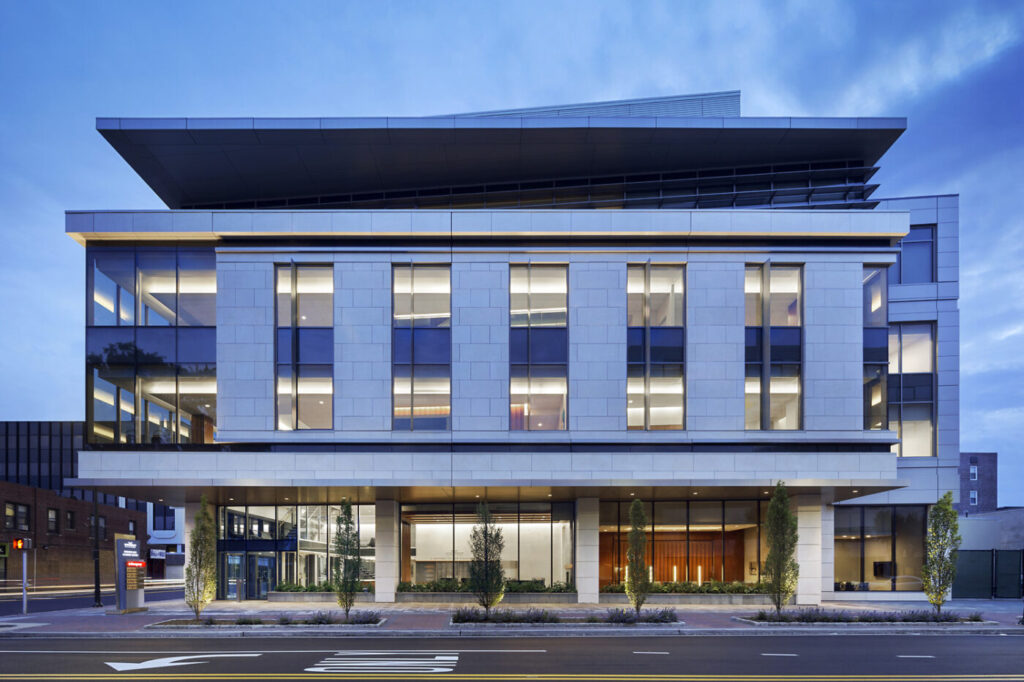
NYU Long Island School of Medicine
The NYU Long Island School of Medicine was established in 2018 and is located in Mineola, 30 minutes east of New York City.
- Unranked
- Interview Rates: 17.9% In-state, 9.4% Out-of-state
- Acceptance Rate: 0.55%
- Average GPA: 3.83, Average MCAT: 516
The NYU Long Island School of Medicine is a small medical school, enrolling less than 30 students a year. However, those who make it in enjoy tuition-free medical school with a focus on primary care and public health.
The deadline for the AMCAS is November 15th. Supplemental applications are due by December 1st.
- Tuition-free
- Three-year MD program
- Small and tight-knit
- Extremely low acceptance rate
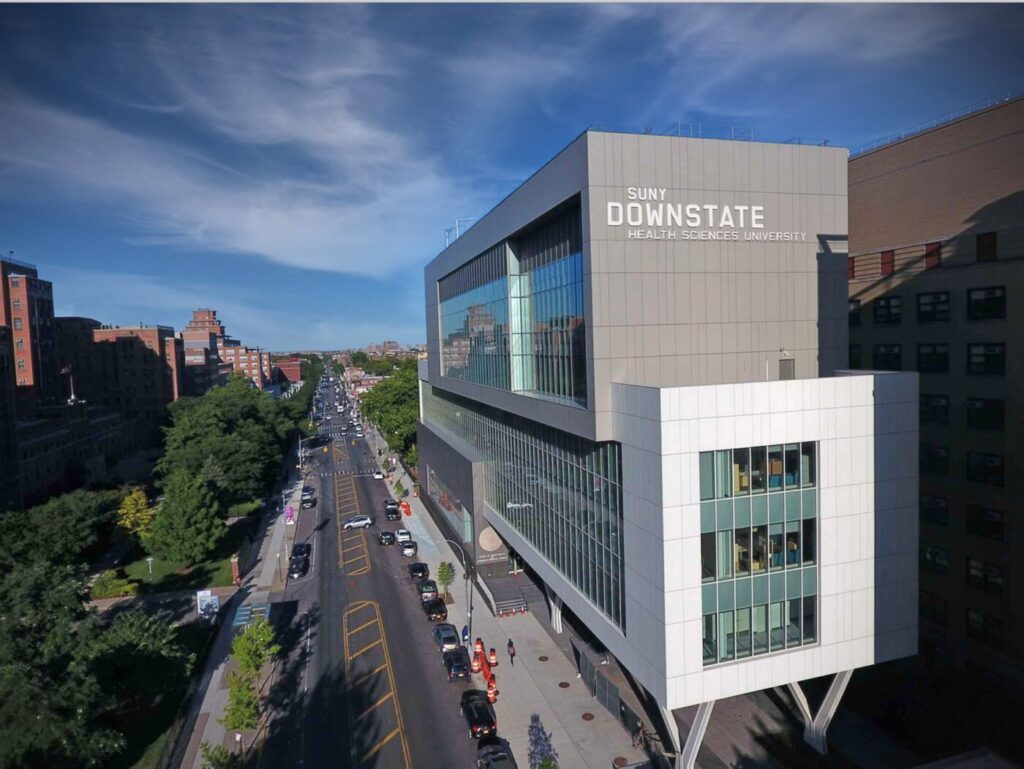
SUNY Downstate Health Sciences University College of Medicine
The SUNY Downstate Health Sciences University College of Medicine was founded in 1860 and is located in Brooklyn.
- Unranked
- Interview Rates: 32.1% In-state, 8.9% Out-of-state
- Acceptance Rate: 14%
- Average GPA: 3.73, Average MCAT: 513
The SUNY Downstate College of Medicine has been the only medical school in Brooklyn for 150 years. The school serves a diverse population and focuses on producing culturally competent, community-oriented physicians. Students eager to tackle urban health problems and serve underserved populations will find a good fit here. SUNY Downstate also includes specialized centers for Alzheimer’s, HIV, and asthma.
The SUNY Downstate College of Medicine has rolling applications, but encourages all applications to be submitted by October 1st.
- Affordable for NY residents
- Emphasis on urban medicine
- High in-state interview rate
- Much higher acceptance rate than the national average
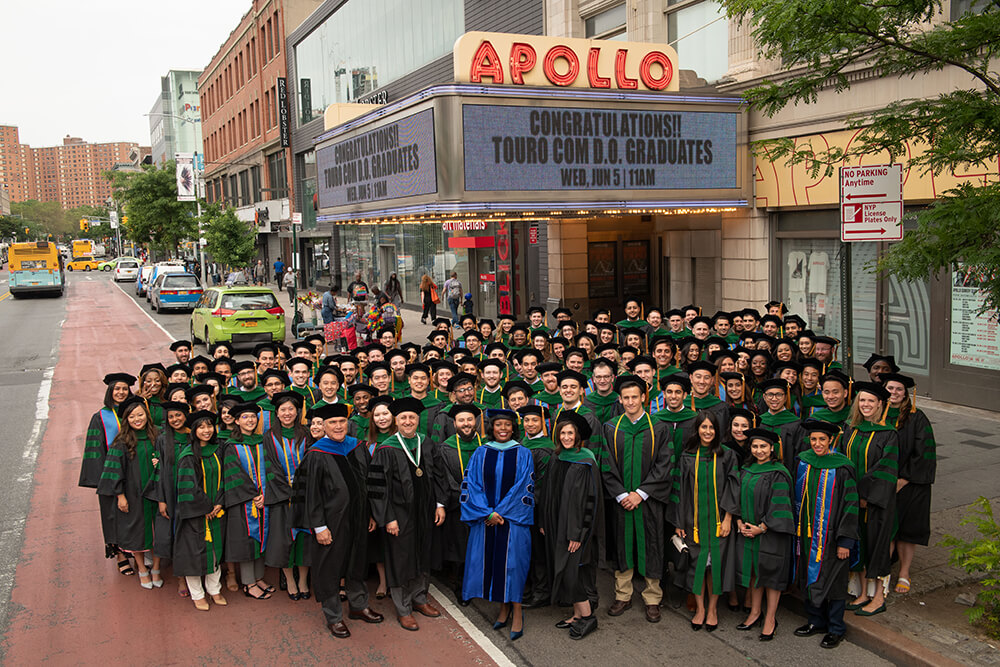
Touro College of Osteopathic Medicine
The Touro College of Osteopathic Medicine was founded in 2007 and is located in Harlem.
- Unranked
- Acceptance Rate: 8%
- Average GPA: 3.48, Average MCAT: 502
With over 75% of its affiliated clinical sites in underserved communities, the Touro College of Osteopathic Medicine is committed to training doctors to meet the needs of these populations. The school has a diverse student body and emphasizes community service, primary care, and public health.
Admissions at the Touro College of Osteopathic Medicine are rolling until March 1st.
- DO degree
- Focus on enrolling underrepresented communities and serving underserved populations
- Higher acceptance rate than the national average
Good Luck to You!
If you’re interested in attending one of the medical colleges in New York, we can help. Our team of experienced admissions consultants will work with you to create an application that stands out from the rest. We know what it takes to be accepted into one of these competitive schools and we want to help you achieve your dream of becoming a doctor in a world with an unfortunate shortage of physicians. Explore our services today and let’s get started on the path to success!

